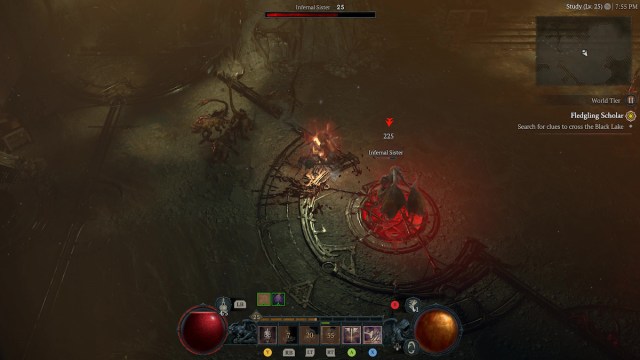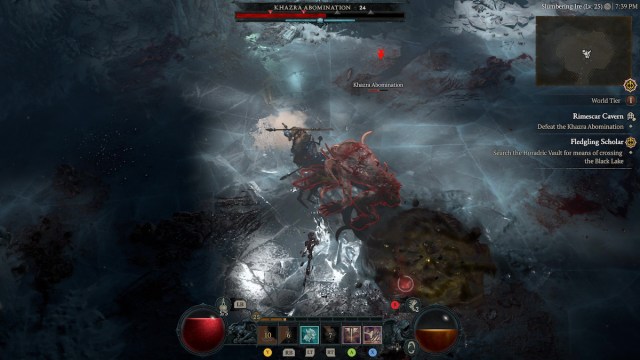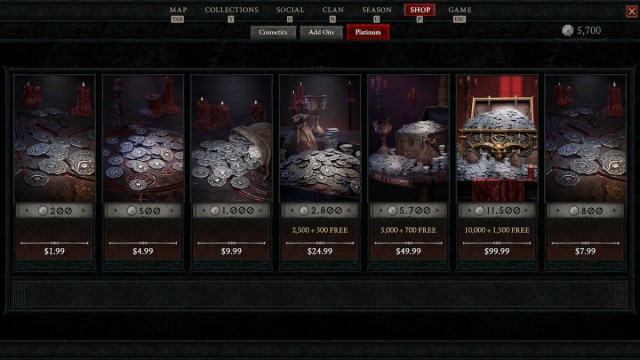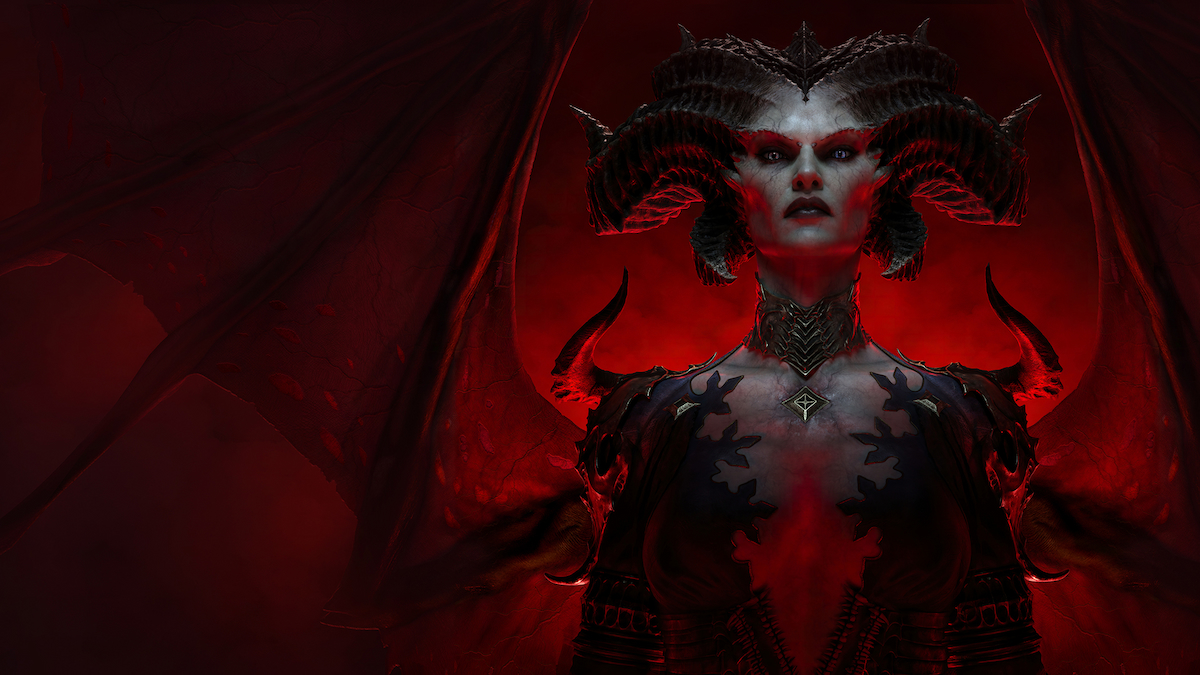Paving the road to Hell
During my time with Diablo 4, I couldn’t stop thinking about how precise a good loot-based action-RPG is.
When done right, games of the genre put you in a hypnotic trance. The flow of hacking and slashing as you find rare loot and make numbers go up fires off powerful waves of happiness chemicals in your brain. However, such an inherently repetitive gameplay loop will become tedious if the execution isn’t just right. Since Diablo set the formula that countless action-RPGs since followed, new games in the series come with high expectations. Will Diablo 4 remind us of why we enjoy this genre to begin with, or will the king need to give up its throne?
As someone who never grew up with the Diablo series and only really dived deep into Diablo 3, I didn’t necessarily approach Diablo 4 with this level of scrutiny. However, after marathoning the campaign and seeing what this vast new world offers, I can confidently say that the core of Diablo 4 lives up to the standards established by its forbearers. Unfortunately, the state of modern video game monetization is also here to remind us why we can’t have nice things.

Diablo 4 (PC [reviewed], PlayStation 5, Xbox Series X|S, PlayStation 4, Xbox One)
Developer: Blizzard Entertainment
Publisher: Blizzard Entertainment
Release: June 6, 2023
MSRP: $69.99
Right out of the gate, Diablo 4 wants you to know that this is a game for grown-ups. Lots of blood is spilled to summon the game’s big bad Lilith, who will either save or ruin the world depending on who you ask. People die in gruesome ways, and limbs will fly before you reach the game’s ending. This ain’t your dad’s Diablo, assuming your dad only played Diablo 3. Actually, that logistically seems unlikely. This ain’t your slightly older sibling’s Diablo.
Diablo 4 puts a lot of effort into its storytelling, but I can’t say the plot ever connected with me. Its writing and structure don’t take enough time to build up its characters, so the bigger story moments don’t land nearly as well as they should. I didn’t care for the main cast, and I didn’t feel any attachment to the fate of Sanctuary. People invested in the Diablo canon might feel shocked or moved by Diablo 4, but it did nothing for me.
It’s honestly a bummer because the cutscenes and cinematics in Diablo 4 are executed well. Even with the weak writing, I still felt pumped as I ventured toward the more epic encounters in the adventure. That said, the plot does connect a variety of diverse set pieces for players to battle through. And in an action-RPG that hopes to engage you for hours, that’s the most important base to cover.
Crawl every dungeon
Diablo 4 smartly does little to change its core formula. Either alone or with friends, players will fight through overwhelming hoards of foes as they spam skills on cooldowns and chug potions. If you’re lucky, you’ll find loot of varying rarity levels that can potentially transform your entire playstyle with their unique effects. Rinse and repeat until you’ve had your fill.
However, Diablo 4 is the first game in the series to be designed with controller support from the outset. As a result, we have both a dedicated dodge button and encounters designed with lots of movement in mind. You’ll feel this most during the boss battles, which lean heavier on MMORPG-style mechanics and even bullet-hell-style projectiles to dodge at the higher end. This design philosophy serves Diablo 4 well, as it feels like a logical evolution of the series’ gameplay. I consistently felt excited to see new enemies and overcome any unique challenges the game would throw at me.
My only minor nitpick is that outside of boss battles, most mobs only lean into these mechanics by using strong attacks telegraphed by long wind-up animations. If you’re surrounded by enemies (and this is Diablo, so that will happen), it’s easy to get killed from full health just because five minor foes all decided to use their most powerful hit at the same time. This is fortunately far from game-breaking, as Diablo 4 lets you fight back with plenty of powerful tools.

Do you want to climb a skill tree?
To begin your adventure, you’ll have to choose from one of five character classes in Diablo 4. However, once you dive into each class’ skill tree, you’ll realize that even a single character represents a multitude of playstyles to choose from.
Many games of this genre either feel too limited or too overwhelming in their customization. Diablo 4 rides a fine line between these two extremes. At the start, the skill tree feels easy to understand. You’ll see a small handful of options and follow a subtly guided path to build your character’s kit. Once you progress further and get a feel for your class’ capabilities, you’ll uncover many synergistic build options just begging to be tried. Fortunately, Diablo 4 makes respeccing easy, though you’ll lose all your hard-earned gold if you swap character builds too often.
Starting out, I built my Barbarian as a tanky guy swinging a giant mace who could spin to win through hoards of monsters. I eventually realized the potential of his Berserk buff, which boosts power and speed if you can maintain it. I tinkered with my build throughout the campaign, eventually transforming completely into an aggressive dual-wielding monster who stayed angry at all times.
This created an incredibly active play style, as I juggled stuns and relentless attacks while timing my Death Blow skill to slay foes at perfect HP thresholds. The class became harder to play, but the exponential DPS gains were well worth the effort. I loved how easily I could customize my gameplay without changing characters. I could focus on spinning to win if I wanted to turn my brain off. But in the end, my character fit my ideal playstyle like a perfectly made glove.
Diablo 4 effortlessly achieves this player freedom without upsetting that delicate dance of a well-paced action-RPG. It virtually guarantees you’ll find a build that you’ll enjoy, assuming Blizzard makes them all viable in the long run.

All things imbalanced
If I have one complaint about Diablo 4 – aside from the thing I’ll get to – it’s how it’s currently balanced.
I started my adventure on the harder World Tier II difficulty, which felt great. Earning more gold and experience after defeating tougher enemies was deeply satisfying. However, if you exceed the recommended level of a given quest or area, enemies will scale to match your power level. By the time I reached my first major story boss, the gear I acquired looked painfully under-leveled compared to the challenge in front of me. I figured that maybe I had just bitten off a bit more than I could chew and that some wonky loot scaling was my problem.
Except as I progressed further into the game, I often found the difficulty would wildly swing at seemingly random. I’d fight climactic story bosses that could barely dent my Barbarian as I smashed them to bits. Then I’d take on a sidequest at the same level against a miniboss that would require me to fight for my life to survive. Admittedly, once I finished messing with my build, I actually welcomed these difficulty spikes. They just happened so often during my campaign that I couldn’t chalk them up to how I built my character or what gear I equipped.
This, fortunately, evened out by the end of the campaign, culminating in an engaging climax. And trust me, if this was my biggest issue with the game, I’d be elated with the overall product. However, we need to discuss the money-hungry elephant in the room.

Greed and Gluttony
In the review build of Diablo 4, all microtransactions and the promised battle pass system were absent. The official word is that this was due to technical logistics. Instead, I was provided pictures and videos of these systems in action. These revealed that the cosmetic shop will sit in one of the main in-game menus, which is already enough for me to say it’s too intrusive.
Diablo 4 is a self-proclaimed live service, forcing a constant internet connection and leaning on multiplayer features. If we’re treating the game like an MMORPG, I can allow some leeway for cosmetic microtransactions. However, the avenue to purchase them has no business within the core gameplay loop of a $70-$100 game. Not only is this immersion breaking, but it also subtly inflicts a psychological temptation that builds over hours of playing and seeing that “SHOP” tab stare you in the face.
Were this something you only saw before logging in, then it wouldn’t be so bad. But considering Diablo 4 rewards collecting cosmetic gear, the shop’s place in the game feels especially insidious. In a free-to-play game, this is something I can deal with. Not in a title with a premium price tag.
The only silver lining is that the shop wasn’t shown in the main character menu, which you’ll interact with most often. And the menu it is in mainly serves as a map screen, so you won’t necessarily need to scroll over the shop often. That is until the battle pass appears, which opens a whole other can of worms.

Sloth, Envy, Pride
Any game using a live service model inherently adds an intense level of uncertainty. Ideally, it allows the game to grow and reward dedicated players. The reality is that the game you bought could fundamentally change into something you don’t recognize. This alone requires me to add an asterisk to any recommendation of Diablo 4.
For example, the preliminary news of battle passes and seasonal content worries me. Limited-time content has messed with my head and caused me to lose sleep grinding in the past. That’s since slipped a bit, especially now that playing games is my job. But three years ago, these systems would seriously damage my health. I know that some people tolerate battle passes, but I’ve never heard a single person say “You know what would make this 80-hour grind better? A deadline.”
Even without speculation, the live service model made my time with Diablo 4 worse. Logging in took longer than necessary as I connected to servers. I had no ability to pause, and my connection would drop while I let the game idle. Even worse, connection issues always made me lose progress, as they reset dungeons and return you to rigid quest checkpoints. My internet woes weren’t necessarily the fault of Diablo 4, but the outcome of them is.
The tradeoff for these hindrances is a handful of multiplayer features that could have worked outside a live service environment. This technically applies to other MMORPGs, but comparing Diablo 4 with previous series entries informs what exactly is gained and lost here. Diablo 3 launched with this issue over a decade ago, and it’s still relevant today.
Live service games require a foundation of trust, as meaningful updates ostensibly justify these inconveniences. Before you buy Diablo 4, ask yourself if you trust Blizzard to deliver an experience that will only get better into the foreseeable future. Otherwise, you’ll need to be content knowing that Diablo 4 could change at any moment, either for better or for worse.

Deal with the devil
It’s a genuine shame I need to talk about any of this because I otherwise really enjoyed Diablo 4. Even after playing the game nonstop, I still want to explore the quests I missed and power up my character. I often lost track of time, totally engaged in Diablo 4’s rhythm. And then I’d lose all my dungeon progress because my internet provider had an issue, which instantly brought me back down to earth.
There is undeniable passion and talent that went into making this game. From the detailed areas you explore to the variety of enemies you’ll fight, Diablo 4 feels complete in a way that’s rare in modern times. I’d love to report back to you in a year and say Diablo 4 is even better than it is now. But in the meantime, these live service elements feel like they exist solely to sell microtransactions. Even if you can ignore these parts of the game, there’s no denying they make the final product worse overall.
For series fans, Diablo 4 makes a compelling case to become your next main game. For everyone else, the specter of cosmetic microtransactions and live service elements hang heavy over this refined action-RPG formula. Fortunately, the game is strong enough out of the box to entertain anyone willing to dive into its world. Everything I played of Diablo 4 was solid, I just hope it stays that way.
[This review is based on a review build of the game provided by the publisher.]


